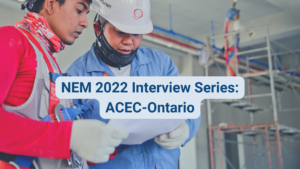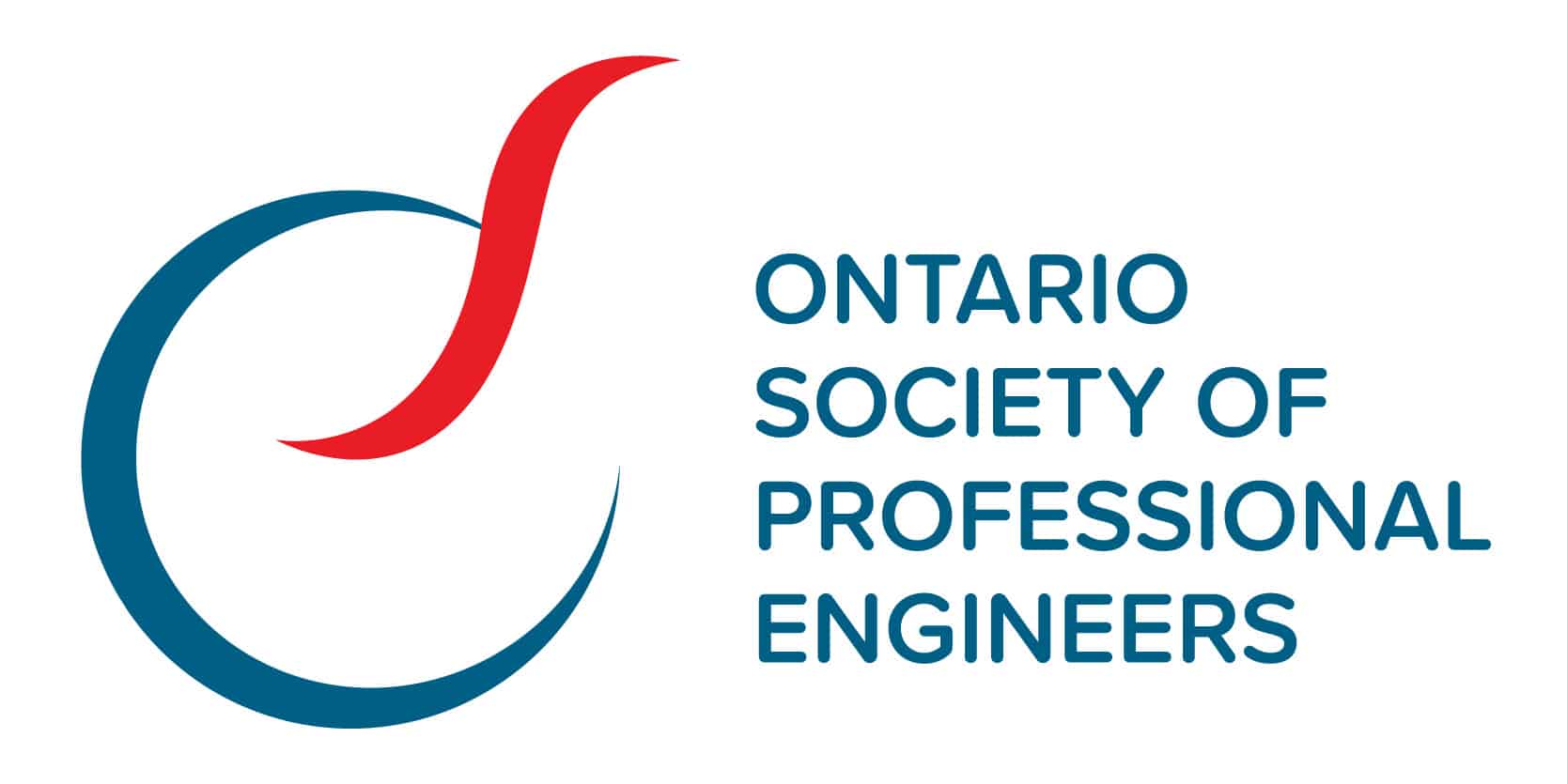
As National Engineering Month Ontario events continue, we are connecting with leaders in Ontario’s engineering community to talk about the future of engineering. This week I met with Bruce G. Matthews, P.Eng., who is the Executive Director of ACEC-Ontario. What follows is a Q&A session about how consulting engineers work within politics to shape large infrastructure projects in the province and beyond.
Q: What is consulting engineering & what do consulting engineers do?
Many people talk about consulting engineering as if it is a separate engineering discipline. But it isn’t. Consulting engineering simply describes the relationship between the provider of engineering services and the receiver of those services. Specifically, there is an arm’s length relationship – the consulting engineer is not an employee of the client.
As an example, a manufacturer may have in-house process engineers or industrial engineers on staff, but from time to time they require additional expertise for a specific project or to solve a problem. They would retain the services of a consulting engineer. Consulting engineers come from every discipline of engineering. Among ACEC-Ontario’s member firms, you can get the full gamut of engineering services: civil-structural, civil-municipal, electrical, mechanical, environmental, geological, control systems, mining, materials, nuclear, aeronautical, and more.
What consulting engineers do is provide independent, objective, expert advice, and services. Those are key, defining adjectives:
- Independent – their work is free from influence and other interests – it’s an outside perspective;
- Objective – the advice and services are based on facts, science, and established engineering standards – there is very limited bias or subjectivity;
- Expert – reflecting extensive knowledge and experience in the field of practice.
The nature of the services cover cradle to grave for a project – ranging from analysis and studies, planning and other pre-design activities (feasibility studies, impact assessments, needs analysis, etc.), to direct design services (small equipment components to major infrastructure such as bridges and buildings, to services During construction or implementation involving verification and contract administration, to post-construction or post-implementation life cycle support services such as the design of upgrades, rehabilitation, or other service-life extension projects, through to decommissioning activities.
All of this is done in the context of the practice of professional engineering: wherein the safeguarding of life, health, property, economic interests, the environment, and public welfare is paramount.
Q: How do consulting engineers work within government and politics? Are consulting engineers actively asked to engage with the government regarding policy and projects?
There are two facets to this:
- Governments at all levels (federal, provincial, and municipal), are major consumers of consulting engineering services. This is the perspective of government as a client.
- Second, governments set public policy and create legislation that can impact professional engineers directly and, more importantly, impact the public welfare. That is the perspective of government as an agent of change.
The good news is that ACEC-Ontario is actively engaged with provincial and municipal governments on both fronts. Advocacy to government is a long-standing pillar of our association. We do this proactively, making submissions based on the business interests of our member firms, but we are also invited by government ministries and agencies to provide input and perspective on relevant matters of public policy and proposed legislation. It’s fair to say that ACEC-Ontario is viewed as a trusted partner and solution provider to government both in its role as a client and as the agent of change.
Q: What type of projects might consulting engineers be hired to help out on?
There is no project too small or too large to benefit from the expertise of consulting engineers. However, if we restrict ourselves to government as a client, then we are typically talking about infrastructure projects, which can encompass anything from public buildings (hospitals, schools, libraries, courthouses, etc.) to water supply and treatment, and wastewater management, roads, bridges, highways, power generation, and transmission, transit systems, airports and more.
If you look at the most recent market update from Infrastructure Ontario, you’ll see 38 projects with an estimated total of $60 billion in contract value. These are generally divided into categories of transit, transportation, healthcare, and justice. And you’ll find consulting engineers on both sides of the project – some directly representing the government client and some working for the contractors or consortium tasked with delivering the infrastructure.
Q: What value do consulting engineers bring to these large governmental projects?
Consulting engineers are problem solvers. They are responsible for finding innovative solutions to technical problems and providing strategic advice to these government clients. They are retained for their experience and expertise, and their unique perspective on public policy and infrastructure issues.
Most of these projects are multidisciplinary in nature, and consulting engineering firms will establish qualified teams to work on a given project. Team member roles may range from purely scientific or technical, to coordinating or managerial, or any combination, depending on the project needs. In many cases, consulting engineers will be responsible for coordinating the efforts and activities of other disciplines and professions that work in the field including natural scientists, technologists, planners, surveyors, architects, ecologists, geoscientists, and a range of other specialties – whatever is needed to deliver the project services most effectively. Others consulting engineering firms may specialize entirely in their own sphere of expertise.
Ultimately, it’s not economically feasible for governments, even at the provincial level, to establish and maintain an appropriately qualified team of in-house engineering staff to service the needs of all of these diverse projects. Retaining a consulting engineering firm facilitates the outcome of achieving the best life-cycle value for the infrastructure project.
Q: How do these projects shape our society and our future?
In two very important ways.
- Every item of public infrastructure has a design life span. It may be measured in decades, but nothing lasts forever. As engineers, the 2nd law of thermodynamics tells us that effort is required just to maintain the status quo. In addition to regular maintenance, items of infrastructure will occasionally need rehabilitation or replacement, just to provide the same service levels as at the time of original construction. Those projects allow Ontarians to enjoy the quality of life they have become accustomed to.
- Governments must plan for projected population growth. The population of the GTA, for example, is expected to increase by more than 40 percent over the next 25 years. Our existing infrastructure can’t be expected to accommodate that amount of growth. Failure to plan and build for growth will have severe adverse economic impacts for the province, and therefore for its citizens. Projects for new infrastructure will allow for corresponding economic growth and prosperity for the province.
I can provide an example of one current infrastructure project that encompasses both of these factors: the QEW Credit River Improvement project. This project includes the rehabilitation of the current QEW highway bridge over the Credit River (which was originally built in 1934 and then widened in 1960), and the project also includes the construction of a new twin bridge to address traffic growth. The completed project will provide for the more effective movement of people and goods, both locally and regionally, within the overall QEW corridor.
Q: How can we learn more about these projects? How is this work celebrated?
As is the case with most of the provincial consulting engineering associations, we have an annual program of awards – ours is called the Ontario Engineering Project Awards – that recognize and celebrate the best work of our member firms. There is also a national-level awards program run jointly by ACEC-Canada and Canadian Consulting Engineer Magazine, called the Canadian Consulting Engineering Awards. Prior to COVID, the awards have been handed out at gala celebrations attended by engineering firms and clients alike. We’re hoping for a return to the gala format next year.
Q: Why do you sponsor NEM? How does NEM intersect with the work you do?
NEM is a nationwide celebration of engineering excellence. It’s a means of generating awareness and interest among those who would be the next generation of engineering professionals raising the profile of the engineering community and creating public awareness of the role that engineers play in society. This is completely consistent with ACEC-Ontario’s mission to promote and advance the business interests of our member firms and the value of the engineering work they do. NEM Ontario and ACEC-Ontario both believe that professional engineers should be recognized for their influence and fundamental contributions to the social, environmental, and economic welfare of Ontario. It’s a natural fit and we are very pleased to be Champion level partners with NEM.
Q: The theme for NEM 2022 is lifelong learning. How can consulting engineers embrace lifelong learning and continue to thrive now and into the future?
The only constant in life is change. Given the rate of technological change and its application across any number of engineering disciplines, the shelf life of a university education in engineering is perhaps only a few years. Professional engineers have to embrace lifelong learning if they want to stay relevant. Using yesterday’s solutions to solve today’s problems isn’t going to cut it. It’s impossible to be innovative without some form of continuing professional development – and clients of consulting engineers expect innovation. I’m pleased to advise that one of the core purposes of ACEC-Ontario, as found in our Letters Patent, is to enhance awareness of the importance of continuing professional education and development among consulting engineers and to provide education and/or training opportunities regarding issues associated directly or indirectly to providing engineering services to the public.
Q: Anything else you’d like to add?
Sure, it’s one thing for consulting engineers to be recognized and appreciated for their accomplishments, it’s another for them to be valued. We believe there is still some work to be done for many consulting engineers to be properly valued for their contributions to projects.
The root cause of them being undervalued is the method of procurement used by many clients – which too often is focused on the lowest price. Our concern is that engineering services are being treated as a commodity.
In the world of engineering services, the lowest price rarely equates to the best value for the client. ACEC-Ontario advocates for Qualifications Based Selection (QBS), which operates on a philosophy that engineering services should be procured on the basis of demonstrated competence and qualification for the type of services required, and at fair and reasonable prices.
QBS is a competitive, transparent procurement process that encourages innovation and lowers risk. Research has shown that QBS results in much lower cost growth and less schedule slippage, especially in complex projects. Using QBS is the law for federal projects in the US and in most individual states. We’d like to see the same thing adopted here, and OSPE has recently joined us in this effort.
About ACEC-Ontario
Founded in 1975, the Association of Consulting Engineering Companies – Ontario (ACEC-Ontario) is a not-for-profit industry advocacy association representing approximately 130 consulting engineering firms that collectively employ 21,000 people across the province.
ACEC-Ontario advocates for a business and regulatory climate that enables our members to provide the highest level of services and best possible value to their clients. ACEC-Ontario promotes the important contribution that consulting engineering makes to the social, economic, and environmental quality of life in Ontario and around the globe.
National Engineering Month is Ontario’s engineering event of the year.
Learn to change the future of engineering – together. Attend National Engineering Month Ontario events. With bold topics, industry expertise, and diverse perspectives, you won’t want to miss it. To stay up to date on the latest news and information about #NEM2022, please visit our website.
National Engineering Month is Ontario’s engineering event of the year.
Learn to change the future of engineering – together. Attend National Engineering Month Ontario events. With bold topics, industry expertise, and diverse perspectives, you won’t want to miss it. To sign up for a #NEM2022 event, please visit our website.


